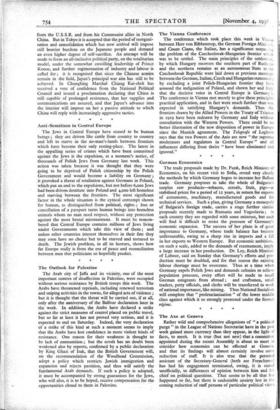German Economics The trade proposals made by Dr. Funk, Reich
Minister of Economics, on his recent visit to Sofia, reveal very dearly the methods by which Germany hopes to increase her Balkan trade. Germany proposes to take the whole of Bulgaria's surplus raw products—tobacco, cereals, fruit, pigs—at stabilised prices for a period of 12 years, in return for exports of armaments, machinery, manufactured goods and for technical services. Such a plan, giving Germany a monopol■' of Bulgaria's foreign trade, carries a stage further similar proposals recently made to Rumania and Yugoslavia ; in each country they are regarded with some mistrust, but each will find it difficult to resist the pressure of Germany's economic expansion. The success of her plans is of great importance to Germany, whose trade balance has become unfavourable, owing to a sharp rise in imports and a fall in her exports to Western Europe. But economic ambitions, on such a scale, added to the demands of rearmament, imply a large increase in her production. Dr. Ley, Reich Minister of Labour, said on Sunday that Germany's efforts and pro- duction must be doubled, and for that reason the existing labour shortage must be overcome. Thus at a time when Germany expels Polish Jews and demands colonies to relieve population pressure, every effort will be made to recall German emigrants from abroad ; and craftsmen, small traders, petty officials, and clerks will be transferred to work of national importance, like mining. Thus National Socialism will complete that " proletarianisation " of the lower middle class against which it so strongly protested under the former regime.










































 Previous page
Previous page